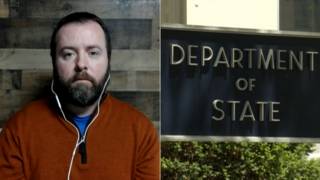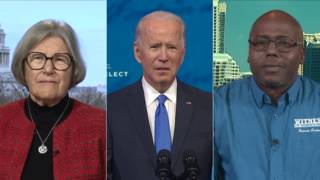
Related
Topics
Guests
- Noam Chomskyworld-renowned political dissident, linguist and author. He is a laureate professor in the Department of Linguistics at the University of Arizona and professor emeritus at the Massachusetts Institute of Technology.
As Attorney General William Barr releases Robert Mueller’s long-anticipated report into Russian interference in the 2016 election, we speak with world-renowned political dissident, linguist and author Noam Chomsky about what he sees as the political perils of “Russiagate.”
More from this Interview
- Part 1: Noam Chomsky: We Must Confront the “Ultranationalist, Reactionary” Movements Growing Across Globe
- Part 2: Chomsky: Nuclear Weapons, Climate Change & the Undermining of Democracy Threaten Future of Planet
- Part 3: Chomsky: Arrest of Assange Is “Scandalous” and Highlights Shocking Extraterritorial Reach of U.S.
- Part 4: Chomsky: Trump Radically Interfered with Israel’s Election to Help Re-elect Netanyahu
- Part 5: Noam Chomsky: The Green New Deal Is Exactly the Right Idea
- Part 6: Chomsky: By Focusing on Russia, Democrats Handed Trump a “Huge Gift” & Possibly the 2020 Election
Transcript
AMY GOODMAN: Can you share your analysis of President Trump? You have lived through so many presidents. Explain President Trump to us and assess the massive response to him.
NOAM CHOMSKY: Well, Trump is—you know, I think there are a number of illusions about Trump. If you take a look at the Trump phenomenon, it’s not very surprising. Think back for the last 10 or 15 years over Republican Party primaries, and remember what happened during the primaries. Each primary, when some candidate rose from the base, they were so outlandish that the Republican establishment tried to crush them and succeeded in doing it—Michele Bachmann, Herman Cain, Rick Santorum. Anyone who was coming out of the base was totally unacceptable to the establishment. The change in 2016 is they couldn’t crush him.
But the interesting question is: Why was this happening? Why, in election after election, was the voting base producing a candidate utterly intolerable to the establishment? And the answer to that is—if you think about that, the answer is not very hard to discover. During the—since the 1970s, during this neoliberal period, both of the political parties have shifted to the right. The Democrats, by the 1970s, had pretty much abandoned the working class. I mean, the last gasp of more or less progressive Democratic Party legislative proposals was the Humphrey-Hawkins Full Employment Act in 1978, which Carter watered down so that it had no teeth, just became voluntary. But the Democrats had pretty much abandoned the working class. They became pretty much what used to be called moderate Republicans. Meanwhile, the Republicans shifted so far to the right that they went completely off the spectrum. Two of the leading political analysts of the American Enterprise Institute, Thomas Mann, Norman Ornstein, about five or 10 years ago, described the Republican Party as what they called a “radical insurgency” that has abandoned parliamentary politics.
Well, why did that happen? It happened because the Republicans face a difficult problem. They have a primary constituency, a real constituency: extreme wealth and corporate power. That’s who they have to serve. That’s their constituency. You can’t get votes that way, so you have to do something else to get votes. What do you do to get votes? This was begun by Richard Nixon with the Southern strategy: try to pick up racists in the South. The mid-1970s, Paul Weyrich, one of the Republican strategists, hit on a brilliant idea. Northern Catholics voted Democratic, tended to vote Democratic, a lot of them working-class. The Republicans could pick up that vote by pretending—crucially, “pretending”—to be opposed to abortion. By the same pretense, they could pick up the evangelical vote. Those are big votes—evangelicals, northern Catholics. Notice the word “pretense.” It’s crucial. You go back to the 1960s, every leading Republican figure was strongly, what we call now, pro-choice. The Republican Party position was—that’s Ronald Reagan, George H.W. Bush, all the leadership—their position was: Abortion is not the government’s business; it’s private business—government has nothing to say about it. They turned almost on a dime in order to try to pick up a voting base on what are called cultural issues. Same with gun rights. Gun rights become a matter of holy writ because you can pick up part of the population that way. In fact, what they’ve done is put together a coalition of voters based on issues that are basically, you know, tolerable to the establishment, but they don’t like it. OK? And they’ve got to hold that, those two constituencies, together. The real constituency of wealth and corporate power, they’re taken care of by the actual legislation.
So, if you look at the legislation under Trump, it’s just lavish gifts to the wealth and the corporate sector—the tax bill, the deregulation, you know, every case in point. That’s kind of the job of Mitch McConnell and Paul Ryan, those guys. They serve the real constituency. Meanwhile, Trump has to maintain the voting constituency, with one outrageous position after another that appeals to some sector of the voting base. And he’s doing it very skillfully. As just as a political manipulation, it’s skillful. Work for the rich and the powerful, shaft everybody else, but get their votes—that’s not an easy trick. And he’s carrying it off.
And, I should say, the Democrats are helping him. They are. Take the focus on Russiagate. What’s that all about? I mean, it was pretty obvious at the beginning that you’re not going to find anything very serious about Russian interference in elections. I mean, for one thing, it’s undetectable. I mean, in the 2016 election, the Senate and the House went the same way as the executive, but nobody claims there was Russian interference there. In fact, you know, Russian interference in the election, if it existed, was very slight, much less, say, than interference by, say, Israel. Israel, the prime minister, Netanyahu, goes to Congress and talks to a joint session of Congress, without even informing the White House, to attack Obama’s policies. I mean, that’s dramatic interference with elections. Whatever the Russians tried, it’s not going to be anything like that. And, in fact, there’s no interference in elections that begins to compare with campaign funding. Remember that campaign funding alone gives you a very high prediction of electoral outcome. It’s, again, Tom Ferguson’s major work which has shown this very persuasively. That’s massive interference in elections. Anything the Russians might have done is going to be, you know, peanuts in comparison. As far as Trump collusion with the Russians, that was never going to amount to anything more than minor corruption, maybe building a Trump hotel in Red Square or something like that, but nothing of any significance.
The Democrats invested everything in this issue. Well, turned out there was nothing much there. They gave Trump a huge gift. In fact, they may have handed him the next election. That’s just a—that’s a matter of being so unwilling to deal with fundamental issues, that they’re looking for something on the side that will somehow give political success. The real issues are different things. They’re things like climate change, like global warming, like the Nuclear Posture Review, deregulation. These are real issues. But the Democrats aren’t going after those. They’re looking for something else—the Democratic establishment. I’m not talking about the young cohort that’s coming in, which is quite different. Just all of that has to be shifted significantly, if there’s going to be a legitimate political opposition to the right-wing drift that’s taking place. And it can happen, can definitely happen, but it’s going to take work.
AMY GOODMAN: The world-renowned linguist and political dissident Noam Chomsky, speaking at the Old South Church in Boston last Thursday night. Go to democracynow.org to see more of the interview and to see his speech. You can go to democracynow.org for our video and audio podcasts, as well as transcripts of all of our shows.
Democracy Now! has an immediate opening for a paid, full-time digital fellowship here in New York City. We also are accepting applications for paid, 6-month internships. Learn more at democracynow.org.











Media Options